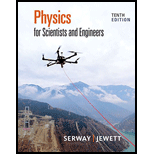
Concept explainers
At the equator, near the surface of the Earth, the magnetic field is approximately 50.0 μT northward, and the electric field is about 100 N/C downward in fair weather. Find the gravitational, electric, and magnetic forces on an electron in this environment, assuming that the electron has an instantaneous velocity of 6.00 × 106 m/s directed to the east.
Answer to Problem 1P
Explanation of Solution
Given info: The magnetic field is
Explanation:
The formula to calculate the gravitational force is,
Here,
Substitute
The formula to calculate the electric force is,
Here,
Substitute
The direction of electric force is upwards.
The formula to calculate the magnetic force is,
Here,
Substitute
The direction of magnetic force is downwards.
Conclusion:
Therefore, the gravitational, electric and magnetic force on an electron is
Want to see more full solutions like this?
Chapter 28 Solutions
Physics for Scientists and Engineers
- Calculate the magnitude of the magnetic field at a point 25.0 cm from a long, thin conductor carrying a current of 2.00 A.arrow_forwardA proton travels with a speed of 3.00 106 m/s at an angle of 37.0 with the direction of a magnetic field of 0.300 T in the +y direction. What are (a) the magnitude of the magnetic force on the proton and (b) its acceleration?arrow_forwardA wire 2.80 m in length carries a current of 5.00 A in a region where a uniform magnetic field has a magnitude of 0.390 T. Calculate the magnitude of the magnetic force on the wire assuming the angle between the magnetic field and the current is (a) 60.0, (b) 90.0, and (c) 120.arrow_forward
- A long, straight, horizontal wire carries a left-to-right current of 20 A. If the wire is placed in a uniform magnetic field of magnitude 4.0105 T that is directed vertically downward, what is tire resultant magnitude of the magnetic field 20 cm above the wire? 20 cm below the wire?arrow_forwardRank the magnitudes of' the forces exerted on the following particles from largest to smallest. In your ranking, display any cases of equality, (a) an electron moving at 1 Mm/s perpendicular to a 1-mT magnetic field (b) an electron moving at 1 Mm/s parallel to a 1-mT magnetic field (c) an electron moving at 2 Mm/s perpendicular to a 1-mT magnetic field (d) a proton moving at 1 Mm/s perpendicular to a 1-mT magnetic field (e) a proton moving at 1 Mm/s at a 45 angle to a 1-mT magnetic fieldarrow_forwardDoes increasing the magnitude of a uniform magnetic field through which a charge is traveling necessarily mean increasing the magnetic force on the charge? Does changing the direction of the field necessarily mean a change in the force on the charge?arrow_forward
- A long, straight wire lies on a horizontal table and carries a current of 1.20 μA. In a vacuum, a proton moves parallel to the wire (opposite the current) with a constant speed of 2.30 × 104 m/s at a distance d above the wire. Ignoring the magnetic field due to the Earth, determine the value of d.arrow_forwardWhen the current through a circular loop is 6.0 A, the magnetic field at its center is 2.0104 T. What is the radius of the loop?arrow_forwardA proton (charge +e, mass mp), a deuteron (charge +e, mass 2mp), and an alpha particle (charge +2e, mass 4mp) are accelerated from rest through a common potential difference V. Each of the particles enters a uniform magnetic field B, with its velocity in a direction perpendicular to B. The proton moves in a circular path of radius p. In terms of p, determine (a) the radius rd of the circular orbit for the deuteron and (b) the radius r for the alpha particle.arrow_forward
- What magnetic field is required in order to confine a proton moving with a speed of 4.0 × 106 m/s to a circular orbit of radius 10 cm?arrow_forwardAssume the region to the right of a certain plane contains a uniform magnetic field of magnitude 1.00 mT and the field is zero in the region to the left of the plane as shown in Figure P22.71. An electron, originally traveling perpendicular to the boundary plane, passes into the region of the field. (a) Determine the time interval required for the electron to leave the field-filled region, noting that the electrons path is a semicircle. (b) Assuming the maximum depth of penetration into the field is 2.00 cm, find the kinetic energy of the electron.arrow_forwardRank the magnitudes of the following magnetic fields from largest to smallest, noting any cases of equality. (a) the field 2 cm away from a long, straight wire carrying a current of 3 A (b) the Held at the center of a flat, compact, circular coil, 2 cm in radius, with 10 turns, carrying a current of 0.3 A (c) the field at the center of a solenoid 2 cm in radius and 200 cm long, with 1 000 turns, carrying a current of 0.3 A (d) the field at the center of a long, straight, metal bar, 2 cm in radius, carrying a current of 300 (e) a field of 1 mTarrow_forward
 Principles of Physics: A Calculus-Based TextPhysicsISBN:9781133104261Author:Raymond A. Serway, John W. JewettPublisher:Cengage Learning
Principles of Physics: A Calculus-Based TextPhysicsISBN:9781133104261Author:Raymond A. Serway, John W. JewettPublisher:Cengage Learning Physics for Scientists and Engineers: Foundations...PhysicsISBN:9781133939146Author:Katz, Debora M.Publisher:Cengage Learning
Physics for Scientists and Engineers: Foundations...PhysicsISBN:9781133939146Author:Katz, Debora M.Publisher:Cengage Learning Glencoe Physics: Principles and Problems, Student...PhysicsISBN:9780078807213Author:Paul W. ZitzewitzPublisher:Glencoe/McGraw-Hill
Glencoe Physics: Principles and Problems, Student...PhysicsISBN:9780078807213Author:Paul W. ZitzewitzPublisher:Glencoe/McGraw-Hill
 Physics for Scientists and Engineers, Technology ...PhysicsISBN:9781305116399Author:Raymond A. Serway, John W. JewettPublisher:Cengage Learning
Physics for Scientists and Engineers, Technology ...PhysicsISBN:9781305116399Author:Raymond A. Serway, John W. JewettPublisher:Cengage Learning College PhysicsPhysicsISBN:9781285737027Author:Raymond A. Serway, Chris VuillePublisher:Cengage Learning
College PhysicsPhysicsISBN:9781285737027Author:Raymond A. Serway, Chris VuillePublisher:Cengage Learning





